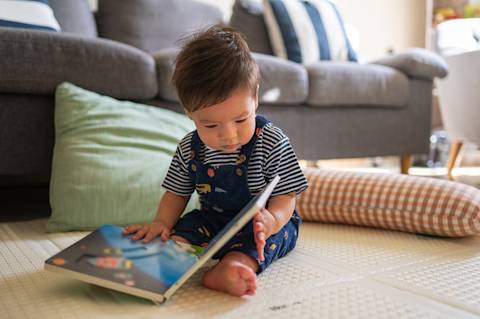Experiencing some types of stress is a natural part of life. By knowing the different types of stress and how they can affect us, we can help our children work through their stress in a healthy way.

Is there such a thing as good stress? The answer is yes! Good stress often feels like nervous excitement. Children might feel this type of stress when they go to school for the first time or try a new activity. Also called eustress, good stress can help children perform better and make them feel energized to tackle a new task. Children experiencing eustress might be extra bubbly and chatty. They might have more energy than usual and can’t sit down.
Encouraging and supporting your child when they feel good stress can help them develop a positive mindset about this type of stress that can benefit them throughout their life. As they get older and face more situations that produce eustress, like speaking in front of their class or trying out for a school play, they’re more likely to recognize the stress they feel as positive and motivational. You can try encouraging words like, “Wow, this is so exciting” or “I’m so proud of you for trying something new.”
Acute stress, or short-term stress, is a response to a specific negative event. Sometimes, this stress can be triggered by a smaller event like dropping a much-anticipated ice cream cone on the ground or a larger event like moving to a new neighborhood. Acute stress can leave us feeling drained and exhausted, but it typically goes away in a few hours or a day. Children who are facing this type of stress might be more tearful or reactive than usual. You might notice changes in their behavior, eating, and sleeping patterns. Some children experiencing acute stress might complain of a stomach ache.
Importantly, as caregivers, we can help our children bounce back from stressful moments by supporting them and showing that we love them no matter what. This love and support can help prevent potential long-term consequences of acute stress. You can try:
Asking them how they’re feeling and listening to their response
Explaining that it’s OK to feel those big feelings and reminding them that you love them
Helping them talk through the situation
Helping them find healthy ways to cope, like playing a favorite game, practicing some dragon breathing, or giving them a long hug
Toxic stress happens when we face a traumatic situation and don’t get the support we need to heal from that experience. If our bodies don’t get any relief from the heightened reactions caused by traumatic experiences, it can negatively impact our physical and mental health, leading to headaches, trouble sleeping, anxiety, high blood pressure, and more. Think of it like revving a car engine over and over again for weeks at a time. Eventually, the engine will wear out.
Events like abuse, violence, neglect, or divorce can lead to toxic stress. Though, it’s important to remember that divorce is sometimes unavoidable as it can be best for the whole family. With love and support, children will not experience toxic stress. Signs of toxic stress to look for include increased moodiness or irritability, losing interest in activities they once enjoyed, becoming clingy and not wanting to leave your side, or being fearful of everyday situations.
If you’re concerned that your child might be experiencing toxic stress, you can help them heal by helping them feel safe, loved, and protected. You can try:
Developing routines that add structure to your child’s day and letting them know what to expect. This can help them feel secure and safe. An example of a routine is reading a short book together before bed. Read more about developing kid-friendly routines.
Teaching them healthy coping skills. Breathing exercises and stretching can help children work through their emotions.
Spending one-on-one time together doing things they love. Many children feel loved and supported when they have their caregiver’s full attention. Try playing their favorite game together, going on a walk, visiting a park, or reading a book together. Having positive experiences with loved ones can buffer against toxic stress.
As a caregiver, your love and support can protect your child from the negative effects of toxic stress. To learn more about toxic stress and how to protect your child, watch this short video. You can also learn more about Adverse Childhood Experiences in this previous article.






